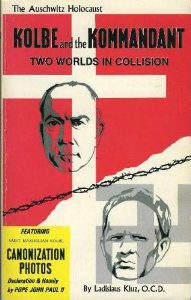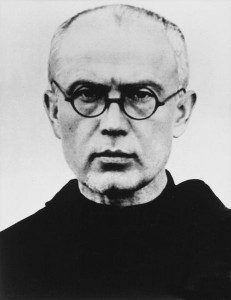A remarkable book came my way recently by a Polish Carmelite priest named Fr. Ladislaus Kluz, OCD. Kolbe and the Kommandant: Two Worlds in Collision offers a dual biography of two figures which have captured the attention of millions in recent history but for dramatically and painfully different reasons.

Growing up within a few hundred miles from each other and only six years apart, Kluz describes how both St. Maximilian Kolbe, Catholic priest and martyr, and Rudolph Hoess, Kommandant of Auschwitz, were each raised in devout Catholic families. In fact, both men desired to become priests, and by the time of his execution for war crimes, Hoess expressed regret that he had not continued to follow God’s law and pursue a priestly vocation, rather than giving his obedience blindly to the Nazis.
At a young age, St. Kolbe entered the Conventual Franciscan Order and Hoess gave up on his plans to become a priest and gave up his faith. Instead, he became a militant and decorated soldier who began to apply himself to the base and dehumanizing treatment of his fellow man for the cause of German dominance. After serving a prison sentence for murder, Hoess settled into what he hoped would be a quiet life of agriculture with his wife and children as he subscribed to the ideology of the Artaman Union, a group of young people from many political groups in Germany who desired to reject the superficiality of the day and return to a healthy and natural peasant life. But it wouldn’t be long before the Nazis would find in his former dehumanizing behavior a suitable tool for their cause.
In the meantime, St. Kolbe, even prior to ordination, began Militia Immaculata, an apostolate dedicated to increasing faith and devotion to the Immaculate Conception. While placing their vows of poverty at the center of their community, the Blessed Mother showered graces upon their efforts until their evangelizing publication reached millions in Europe and tens of thousands in Japan and other countries. St. Kolbe was an intrepid missionary and profoundly moving witness to Christ in the context of spiritual father and confessor.
Eventually, Hoess became the mastermind behind the death chambers of Auschwitz, particularly proud of the efficiency with which he could execute huge numbers of people. St. Kolbe was imprisoned in several camps, finally arriving at Auschwitz, where he ultimately provided a shining and otherworldly example of love and peace for those who knew him.
He was a refugee from insanity. I remember I risked my life once. I stole some potato peelings from a kitchen cart. And though Fr. Kolbe was very, very hungry, he didn’t ask for any food. He gave his food away, the little food we received, twice a day. The average American doesn’t realize, even the Catholics don’t realize, of his existence, his greatness. He gave away his food. He taught me so many things. His lips were swollen from hunger, but he was always smiling, always cheerful, the only one. Go spoke through him. It was always raining at Auschwitz and Fr. Kolbe said it was God crying with us.
Sigmund Gorson, Polish Jew and survivor of Auschwitz*
When a man was to be executed who cried out in pain for the fate of his wife and children, St. Kolbe volunteered to take his place, spending more than two weeks in starvation barracks, leading the other 9 men with him in hymns of praise to God as they each died, one by one. By the time the barracks were opened, St. Kolbe was the only man left alive—the orderly who removed his body from the cell testified that “it was strangely clean and radiant, not grimy and contorted as the others were”—and they finished him off with a lethal injection on August 14, 1941. His body was burned and ashes commingled with the countless others who met their earthly demise in that same place. At his canonization, the only first class relics which could be offered to the Church were collections of soil from Auschwitz.
Hoess, once the Nazis were defeated, stood trial and was sentenced to death, hung just outside of Auschwitz on April 16th, 1947. The author includes a great deal of personal correspondence from Hoess, who wrote an autobiography before he died and also wrote to his wife and children. Eventually, he came to express remorse about his actions. While it is clear that he initially denied responsibility, placing any of his own culpability into the hands of his superiors to whom he was unquestionably obedient, he wrote several times of the shock he experienced when finding, in the Polish prison, that there, the Poles still continue to see in him his humanity and treat him with dignity.
This, it appears, was the eventual means by which Hoess took responsibility for his role at Auschwitz.
My conscience is forcing me to make also the following assertion: In the isolation prison I have reached the bitter understanding of the terrible crimes I have committed against humanity. As a Kommandant of the extermination camp at Auschwitz, I have realized my part in the monstrous genocide plans of the Third Reich. By this means I caused humanity and mankind the greatest harm, and I brought unspeakable suffering particularly to the Polish nation. For my responsibility, I am now paying with my life. Oh, that God would forgive me my deeds! People of Poland, I beg you to forgive me! Just now in the Polish prisons have I recognized what humanity really is. In spite of everything that happened I have been treated humanely, which I had never expected, and this has made me feel deeply ashamed. Would to God…that the fact of disclosing and confirming those monstrous crimes against mankind and humanity may prevent for all future ages even the premises leading to such horrible events. (emphasis mine)
Eventually, Hoess requested a Catholic priest to be brought, and Fr. Lohn, a Jesuit, was brought to the prison from Cracow to hear his final confession and grant him absolution.
St. Kolbe eventually became glorified as a Saint in heaven, interceding for all who call upon him.
That both these men can be reconciled with God and spend eternity with him—what a scandalous faith we have! As Paul proclaimed,
“The message of the cross is foolishness to those who are perishing, but to us who are being saved it is the power of God.” 1 Cor. 1:18, NAB
With God, even the most hardened sinners can be redeemed and spend eternity with Him.
May the prayers of St. Maximilian Kolbe convert many souls in this difficult age.

*All quotes above come from the book cited at the top.
